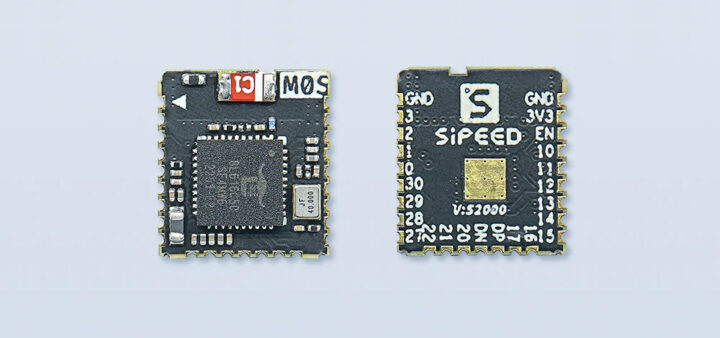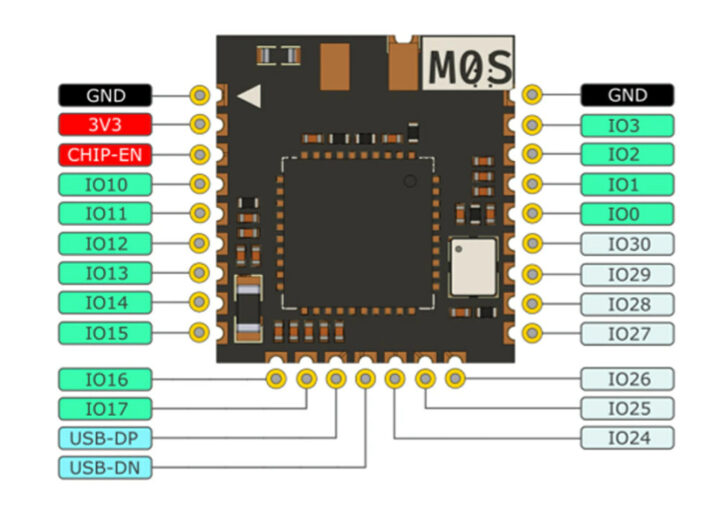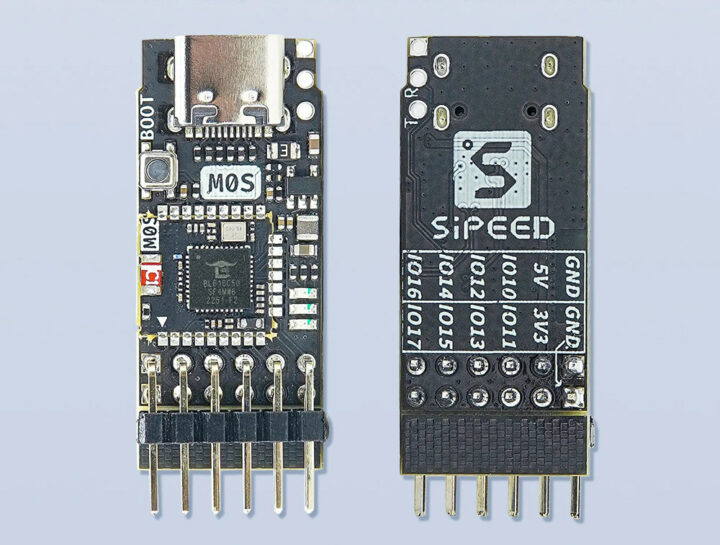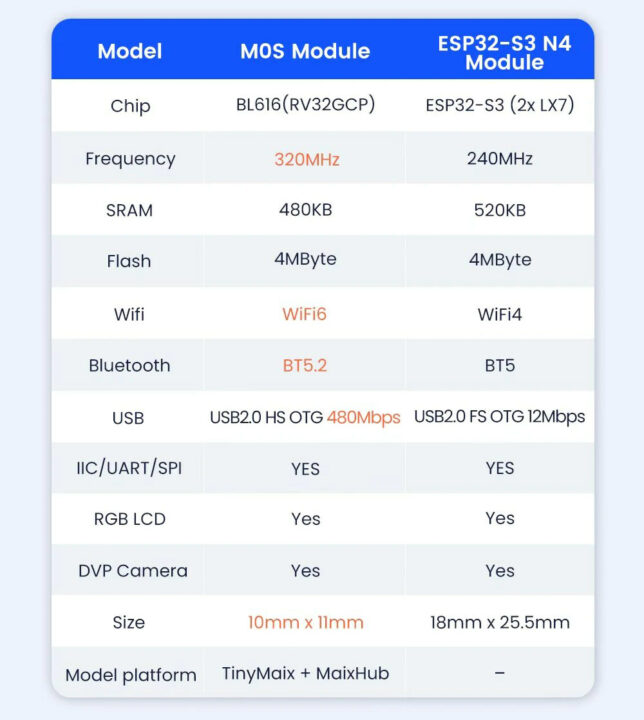As expected, Sipeed has now launched the Sipeed M0S IoT module based on Bouffalo Lab BL616 RISC-V microcontroller with 2.4 GHz WiFi 6, BLE 5.2, and Zigbee connectivity along with the “Sipeed M0S Dock” development board.
The M0S is a tiny module (11×10 mm) with a 320 MHz wireless MCU, a ceramic antenna, and castellated holes for I/Os, and the Sipeed M0S Dock places the module on an easy-to-use board with a USB Type-C port, a BOOT button, and a 12-pin 2.54mm pitch header.
Sipeed M0S module specifications:
- MCU – Bouffalo Lab BL616 32-bit RISC-V (RV32IMAFCP) microcontroller @ up to 320 MHz (384 MHz overclocked) with 480KB SRAM, 4MB flash, 2.4 GHz WiFi 6, Bluetooth 5.2 dual mode, and 802.15.4 radio (Zigbee)
- Antenna – Ceramic antenna (red component on module)
- I/Os – 25 castellated holes with
- RGB LCD
- DVP camera
- USB 2.0 OTG up to 480 Mbps
- I2C, UART, SPI
- Up to 19x GPIO
- Supply Voltage – 3.3V
- Dimensions – 11 x 10 mm
BL616 datasheet and technical reference manual can be found on the Sipeed website. There’s also a Wiki, but it shows BL702 MCU found in M0Sense instead of BL616, so the information there has yet to be fully updated. Sipeed says the board works with Bouffalo Lab bl_mcu_sdk and also provides a repository that’s supposed to come with code samples for the BL616 module and board, but is empty at the time of writing.
So documentation still needs to be worked on. The company also compared the Sipeed M0S module to the ESP32-S3 N4 module probably because both the BL616 and ESP32-S3 come with AI vector instructions to accelerate machine learning workloads.
It should be noted Espressif Systems has also just launched its own ESP32-C6 module with support for 2.4 GHz WiFi 6, Bluetooth 5.0, and Zigbee support. The main advantage may be support for the high-speed USB port, and BL616 also combines AI instructions and WiFi 6 on the same chip, something none of the ESP32 chips provide so far. Having said that Espressif chips still win hands down when it comes to firmware support. As a side note, 2.4 GHz WiFi 6 can be useful for IoT with its low-power feature called Target Wake Time (TWT).
Sipeed is selling the M0S module for $3.19 and the M0S dock for $4.39 plus shipping, but stocks are limited, so you may have to try again later if the item you want is out of stock.

Jean-Luc started CNX Software in 2010 as a part-time endeavor, before quitting his job as a software engineering manager, and starting to write daily news, and reviews full time later in 2011.
Support CNX Software! Donate via cryptocurrencies, become a Patron on Patreon, or purchase goods on Amazon or Aliexpress









Looks nice, but support is a dealbreaker, as said the Bouffalo firmware support docs are minimal, and you don’t have to except any support from Sipeed either, they don’t even have a support mail you have to post on their forum and hope somebody answers.
Yup. Espressif is years ahead on support.
And Nordic, ST, Microchip, etc. are in turn years ahead of Espressif.
This looks like a great chip. There’s not a lot out there with dual mode bluetooth. But am I really supposed to reverse engineer the thing and write RTOS support myself from scratch? I’ll be obsolete by the time I finish.
Except when they are not for the average day to day projects.
Espressif wins with plattform.io and Arduino support and the massive public knowledge on the web….
I’m confused about the flash. The BL616 block diagram on the announcement page last month shows the flash as an external component, but I don’t see any flash chips on the module or on the dock board.
https://cdn.cnx-software.com/wp-content/uploads/2022/12/BL616-BL818-block-diagram.png
Storage – 128KB ROM, 4Kb eFuse, embedded 2, 4, or 8MB flash (optional), XIP QSPI flash support, SD card interface
There should be differents SKU for none, 2, 4 or 8MB. This one uses 4MB.
Another 4$ for shipping and out of stock.
Unfortunately, bluetooth seems not to be supported at the moment by the SDK.
Also, the pricing is misleading. The shipping price increases by about 2 USD with the amount of m0s devices. I’m more than happy to pay for shipment but this is just hiding it’s price in the shipping fees. I don’t know why serious brands do that, maybe it will change on upcoming batches.
Is that a single row Pmod compatible connector on the opposite end of the USB-C port?